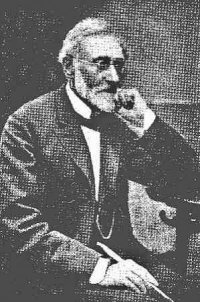Rushkoff tries to support his prescriptive arguments by drafting an elaborate descriptive narrative of the history of Judaism. Regrettably, his history consists of unverifiable claims, factual error, and anachronism. Disregarding his highly speculative and totally unsubstantiated (and impossible to substantiate) take on ancient Jewish history, the heart of his argument is its weakest point: the juxtaposition of what he implies was right Judaism and wrong Judaism. He alleges that right Judaism, which he thinks is best represented by rabbinic Judaism, was practiced more or less consistently by the vast majority of Jews and such diverse thinkers as Maimonides, Spinoza, Marx, and Freud. This includes a proper appreciation for the allegorical nature of Torah, universalism, rationalism, iconoclasm, and effectively a post-modern, Kaplanesque understanding of the meaning of the word "God." Indeed, he states outright that God is not something that Jews are supposed to worry about. Wrong Judaism, in contrast, consists of all the things Rushkoff does not like about Judaism:
 mysticism, theurgic ritual practice, messianism, messianic myths of exile
and redemption, chauvinism, nationalism, literalism, theological
speculation, positive beliefs about the nature of God and Torah, and any confusion of metaphors and myths for historical reality. Rushkoff pretends not only that these things (traditions more than a thousand years old) are not representative of true Judaism, but also that they are pathologies resulting entirely from persecution and the pressures of modernity. (Here Rushkoff echoes nineteenth-century German reformers and Wissenschaft scholars, giants of modern-Jewish thought like Abraham Geiger and Heinrich Graetz, however he does not mention them and is apparently unaware that they made the exact same arguments.) He locates the principle sources of wrong Judaism as Lurianic Kabbalah, which Rushkoff incorrectly identifies as a response to the Inquisition, and Orthodoxy, which Rushkoff incorrectly identifies as response to the Holocaust. (If anything, Orthodoxy was a response to Reform, and post-Scholem Kabbalah scholars have debunked most of the claims linking Lurianic Kabbalah to the Spanish Expulsion.)
mysticism, theurgic ritual practice, messianism, messianic myths of exile
and redemption, chauvinism, nationalism, literalism, theological
speculation, positive beliefs about the nature of God and Torah, and any confusion of metaphors and myths for historical reality. Rushkoff pretends not only that these things (traditions more than a thousand years old) are not representative of true Judaism, but also that they are pathologies resulting entirely from persecution and the pressures of modernity. (Here Rushkoff echoes nineteenth-century German reformers and Wissenschaft scholars, giants of modern-Jewish thought like Abraham Geiger and Heinrich Graetz, however he does not mention them and is apparently unaware that they made the exact same arguments.) He locates the principle sources of wrong Judaism as Lurianic Kabbalah, which Rushkoff incorrectly identifies as a response to the Inquisition, and Orthodoxy, which Rushkoff incorrectly identifies as response to the Holocaust. (If anything, Orthodoxy was a response to Reform, and post-Scholem Kabbalah scholars have debunked most of the claims linking Lurianic Kabbalah to the Spanish Expulsion.)
Rushkoff's vision of right Judaism is a blatant case of wishful thinking. He really wants to believe that Jews throughout the ages were Enlightened universalists dedicated to iconoclasm, transparency, democracy, science, and not just modernity but post-modernity. To make his case he makes myriad historical claims and marshals an impressive array of historical facts. Regrettably, almost all his claims and facts are wrong, some so blatantly wrong that they should have been caught by the editors, assuming publishers still have editors. For example, Rushkoff identifies the last Czar of Russia as someone named "Peter." (p. 39) Presumably Rushkoff meant Peter the Great (d. 1725). Try Nicholas II. My personal favorite is Rushkoff's observation that "just when it seemed as though the ideals of the Enlightenment were extending to French Jews in the right to citizenship and even to own property, Napoleon died and the Jews were sent back to the ghettos." (143) Had he read any number of the books he cites in his bibliography, he would have recognized that the only correct part of the sentence is that Napoleon did in fact die. In addition, his understanding of past beliefs, outlooks, and mentalities, moreover, is consistently anachronistic. Examples of this abound: in one passage Rushkoff claims that medieval Jews, because they were middlemen, emphasized transparency and wanted to promote fair and open trade, concepts utterly alien to the medieval world. (p. 7) If anything Jewish traders depended on opacity and owed their livelihood to the highly restricted nature of pre-industrial commerce. Elsewhere he compares the convention of substituting two yod letters for the word "God" in liturgy with the contemporary practice of raising our fingers to indicate quotation marks when we speak. The medieval rabbis, he argues, post-modernists that they were, wished to refer to the "sign" of God rather than God while praying. (p. 96) Nice midrash, but pure anachronism. And no historical evidence. Finally, the qualities that he attributes to the post-Inquisition mystics and the post-Holocaust Orthodox indicate that he does not understand either. What he does get right about them, moreover, was not, as he wants to believe, exclusive to them but rather common to many Jews long before the Inquisition and in numbers far greater than the highly-restricted circles of Lurianic Kabbalists and the post-war Orthodox. Examples of this include speculation about and belief in messianism, nationalist or chauvinistic thinking about Israel, and recourse to myth, all pretty much meat and potatoes for countless Jews over the centuries.



Symposium on
Douglas Rushkoff's
Nothing Sacred:
The Sacred and the Profane
A Conversation with Douglas Rushkoff
Reinventing the Wheel: A Review of Nothing Sacred
Michael Shurkin
They Gonna Crucify Me: A 'Lapsed Jew' Responds to Nothing Sacred
Ken Applebaum
Plus these other attractions:
Meditation and Sensuality
Jay Michaelson
Anything You Want to Be
Ben Cohen
Not Mentioned
Hal Sirowitz
Josh Graduates High School
Josh Ring
Zeek in Print
Spring 03 issue available here
Saddies
David Stromberg
about zeek
archive
links